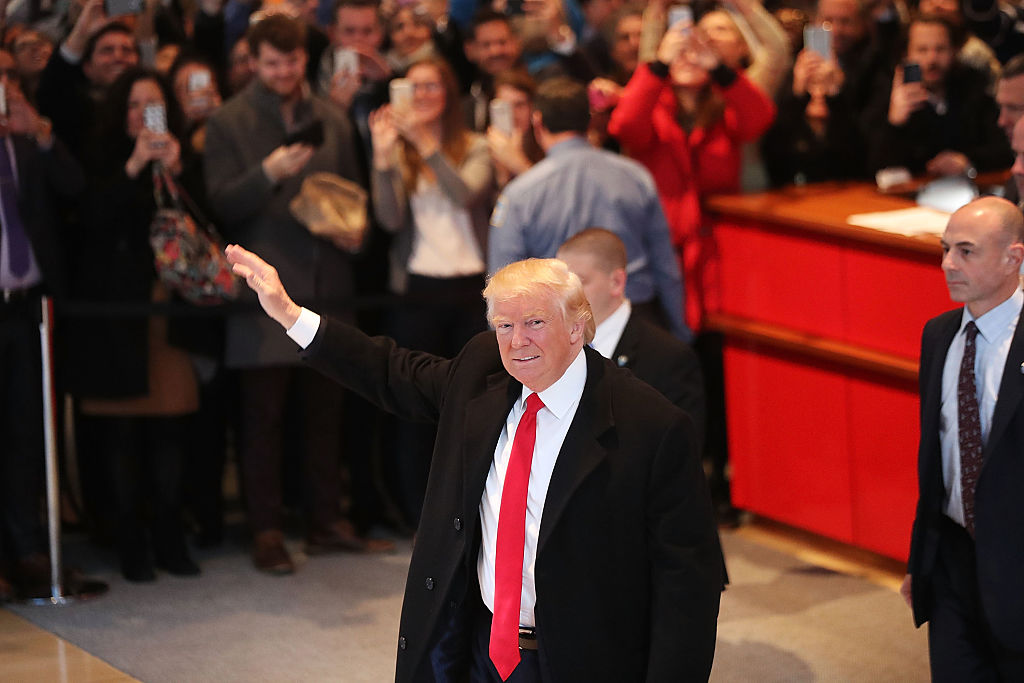Are Jeff Bezos, the world’s richest man and owner of the Washington Post, and Arthur Gregg Sulzberger, hereditary publisher of the New York Times, really ‘enemies of the people’, as Donald Trump has charged? Of course not. No more than their fellow plutocrat, the pussy-grabbing presidential populist.
Trump and Sulzberger took off the gloves last week for a secret meeting, then came out swinging on Twitter. ‘The failing New York Times and the Amazon Post do nothing but write bad stories even on very positive achievements,’ Trump complained. ‘Freedom of the press also comes with a responsibility to report the news accurately.’
The lecture was a bit hard to swallow, given Trump’s well-documented habit of switching one set of facts for a more congenial set. That was the point, though. Trump wanted to goad his targets into admitting that newspapers are businesses, and that their content is inevitably influenced by their business relationships. No one expects the Times to investigate the business practices of the Mexican squillionaire Carlos Slim, who used to be the world’s richest man, and has become a significant holder of Times stock in recent years.
Sulzberger walked into Trump’s trap, and delivered an impeccably elitist plaint of the kind that allows Trump to pose as a friend of the people. Trump’s ‘deeply troubling anti-press rhetoric’, Sulzberger alleged, was ‘eroding one of our country’s greatest exports: a commitment to free speech and the freedom of the press’. The president’s ‘inflammatory language is contributing to a rise in threats against journalists’. This, Sulzberger said, is ‘particularly true abroad’, where ‘some regimes’ are using Trump’s theoretic to ‘justify sweeping crackdowns on journalists’.
Fake news? Pretty much. Has speech ever been more free than in modern online America? Has it ever been cheaper to speak freely than now? If anything, our problem is that speech has become too free — too quick, too unfiltered. Trump sits at the summit of this cheap talk, jaw flapping away and thumbs twitching. You could quibble about the quality of public speech in America, but the quantity is a marvel. Talk, talk, talk, type, type, type.
The freedom of the press is only one element of free speech, though Sulzberger might be forgiven for conflating the two, given that any serious businessman aspires to a monopoly on his product. Again, regardless of your opinion of Trump, it is clear that Trump’s hostile attitude to the largely hostile legacy media has been a gift to what the old charmer calls America’s ‘dying newspaper industry’. A newspaper is a business, and Trump, while he might not have done much for civility, has been good for the media’s bottom line. And that in turn is good for the freedom of the press.
For two decades, the management of legacy media decried digitisation and the collapse of the print economy, and warned that the press was about to die. Now, the rough outlines of a new business model have arisen, due to a combination of factors — newsroom economies, accommodation to digital reality, and the Trump dividend. Trump has made politics alarmingly interesting, in the way that while the Hindenberg in flight was impressive, but the Hindenberg in flames was fascinating. The click count has exploded since Trump took office. Subscriptions are up too. Of course, Trump didn’t set out to grow the Times’ subscription base. Still, the knock-on effect of his knockabout routines has been good for the media, left or right. The truth hurts, but that makes it no less fit to print.
It is impossible to quantify the degree to which, in Sulzberger’s words, Trump’s ‘inflammatory language’ might be ‘contributing to a rise in threats against journalists’. It might just as easily be an effect of the coarsening of public speech, which is taking on causal potency because Trump now broadcasts his studiously ordinary attitudes through the loudest megaphone in the land. That ‘contributing’ suggests that Sulzberger recognizes this much.
It is easier to assess whether Trump’s hostility to journalists has aided ‘sweeping crackdowns on journalists’. When Erdogan’s Turkey topped the charts by imprisoning more journalists than any other state, Trump was still on The Apprentice. The same goes for the violent silencing of critics in Ukraine, Belarus and Russia. Trump’s attitude makes no difference at all to the kind of leaders who really don’t care what anyone thinks. Nor can Trump be held remotely responsible for the rise in journalist deaths in the war zones of the Middle East.
So we have a president who cannot tell the truth, and a publisher who cannot admit the truth. The president sprays fake news like a farmer spraying pig slurry on his fields. The publisher puts his hands in the dirt and complains about the smell, but looks forward to another rich harvest. It’s hard not to feel that they deserve each other, in the way that shock seeks outrage and outrage seeks shock. It’s easy to feel that we deserve better than these frenemies of the people.
Dominic Green is Culture Editor of Spectator USA.


















